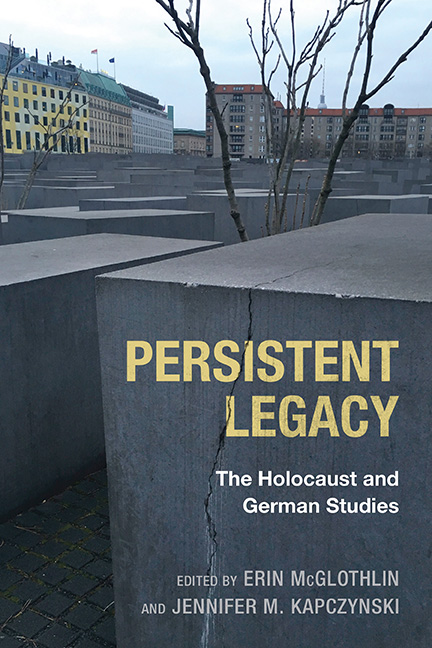Book contents
- Frontmatter
- Contents
- Acknowledgments
- Introduction
- Part I Abiding Challenges
- Part II The Holocaust in German Studies in the North American and the German Contexts
- Part III Disentangling “German,” “Jewish,” and “Holocaust” Memory
- Part IV Descendant Narratives of Survival and Perpetration
- Part V Remediated Icons of Memory
- Part VI Holocaust Memory in Post-Holocaust Traumas
- Notes on the Contributors
- Index
1 - Never Over, Over and Over
Published online by Cambridge University Press: 17 June 2021
- Frontmatter
- Contents
- Acknowledgments
- Introduction
- Part I Abiding Challenges
- Part II The Holocaust in German Studies in the North American and the German Contexts
- Part III Disentangling “German,” “Jewish,” and “Holocaust” Memory
- Part IV Descendant Narratives of Survival and Perpetration
- Part V Remediated Icons of Memory
- Part VI Holocaust Memory in Post-Holocaust Traumas
- Notes on the Contributors
- Index
Summary
IN MARCH 2013 the television miniseries Unsere Mütter, unsere Väter (Generation War) premiered on German television's ZDF station. With a hefty run time of 4.5 hours, the series (directed by Philipp Kadelbach and released by TeamWorx studios, the heavyweight of German historical television today) promised to introduce today's audiences to the generation that came of age during the Second World War. The release was accompanied by extensive media fanfare, including an interview with producer Nico Hofmann and journalist Frank Schirrmacher, published in the Frankfurter Allgemeine Zeitung (FAZ) under the boldly declarative title “Es ist nie vorbei” (It's never over). The phrase stemmed from Schirrmacher, a co-publisher of the FAZ and a vocal supporter of the film, who just three days earlier had urged viewers of all ages to gather before their televisions and seize the chance to create dialogue between postwar generations and the ever-dwindling number of Germans who experienced the war firsthand. In the FAZ interview, he insisted on the continued relevance of “es,” that is, the “it” that is “never over”:
Vielleicht handelt es sich bald tatsächlich nur noch um ein Kapitel im Geschichtsbuch, aber wenn man sich anschaut, wie in Italien oder Spanien über uns diskutiert wird, wenn hier eine rassistische Bewegung entsteht wie der NSU [National Sozialistischer Untergrund], dann steckt da so etwas schon wieder drin. Selbst in der Sarrazin- Debatte oder der aktuellen Diskussion über Sinti und Roma noch. Und ich wäre sehr skeptisch, wenn jetzt behauptet würde: Wir können das nicht mehr sehen, die neue Generation will das nicht mehr sehen. Denn es ist nicht vorbei.
[Maybe it will soon really be just a matter of a chapter in a history book, but when you see how we are talked about in Italy or Spain, when a racist movement like the NSU emerges here, then there's something to it again. Even in the Sarrazin debate or the current discussion about the Sinti and Roma. And I would be really skeptical if the claim were now made: We can't hear it anymore, the new generation doesn't want to hear it. Because it's not over.]
- Type
- Chapter
- Information
- Persistent LegacyThe Holocaust and German Studies, pp. 19 - 32Publisher: Boydell & BrewerPrint publication year: 2016

